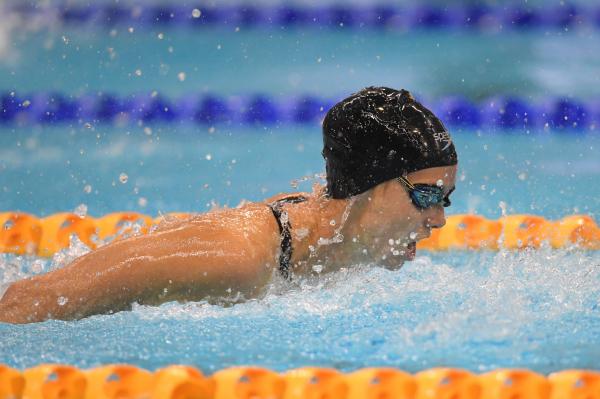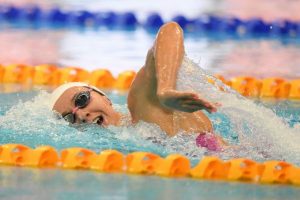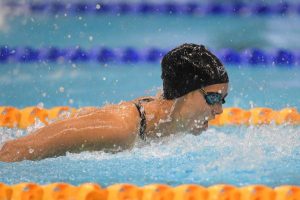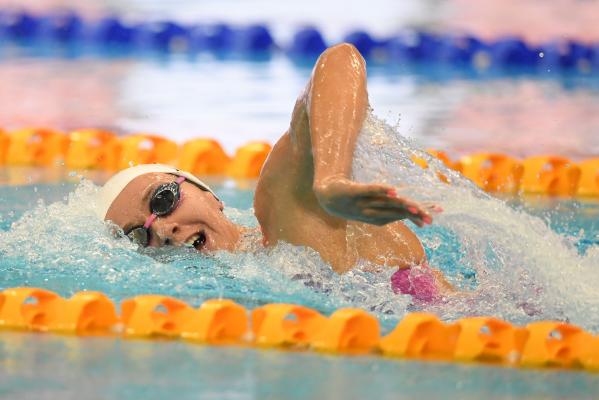
By David Nagel
Australia’s 2021 Olympic team has produced a best-ever performance, winning 17 golds, seven silvers and 22 bronze medals in an epic performance that inspired spectators across the nation. Gazette Sports Editor David Nagel takes a look at 10 of the best Aussie moments from the 29th Olympiad.
1. Jess Fox – Canoe Slalom, Women’s Canoe
The dominant figure in women’s white water was highly fancied to win gold in the K1 kayaking event after qualifying fastest. Fox was clearly disappointed after the touching of two gates cost her four seconds and a gold medal in that event. Fox backed up a day later, again as favourite, in the Olympic debut of the C1 Canoe Slalom. Again she qualified fastest, but this time with no second chance if the multiple world champion was to secure her first Olympic gold medal. Under immense pressure Fox delivered the performance of her life, running the course without penalty to trounce the opposition by 3.64 seconds. It was the possibility of a second disappointment that made the win so special…and we all jumped on board for the ride!
2. Ariarne Titmus – 200 and 400 metres freestyle
Australian’s all love an underdog and despite being a multiple Commonwealth and World Champion, Ariarne Titmus had the enormous task of overcoming the greatest women’s swimmer of all time, United States star Katie Ledecky in the 200 and 400-metre freestyle finals in Tokyo. Titmus became the golden girl of the pool, and won our hearts, with her tenacious come-from-behind style lifting us off the couch in the last 50-metre lap of each contest. Her coach Dean Boxall also played a huge part in the story with his impersonation of his favourite WWE wrestler ‘The Ultimate Warrior’, creating world-wide headlines as he celebrated Ariarne’s success. Ledecky would get revenge in her favoured 800-metre event, but Titmus had set the scene for our golden run in the pool.

3. Emma McKeon – 50 and 100 metre freestyle
Swimming aficionados may have already known what to expect, but for most Australian’s the elevation of Emma McKeon to our greatest ever Olympian was an unexpected highlight of the Tokyo Olympic Games. McKeon won one gold, two silver and a bronze in Rio in 2016, with those gold and silvers coming in team events. To become an Olympic legend the 27-year-old would need to claim individual gold, and she did so twice, with her phenomenally fast starts leading to gold medals in the blue ribband 50 and 100-metre freestyle events. She also claimed two relay golds, and won three bronze medals, with her seven podiums the most of any female swimmer in Olympic history. Her 11 medals make her the most successful Australian Olympian and her five golds are only matched by the great Ian Thorpe.

4. Kaylee McKeown – Women’s 100 and 200-metre backstroke
Nothing could steal the spotlight away from the magnificent performance of Kaylee McKeown, who won two individual gold medals in the 100 and 200-metre backstroke, and also a gold and bronze in relay events in her debut Olympic Games. But there were back stories galore that really did add to the theatre and gave us a wonderful insight into what makes one of our newest Olympic heroes tick. McKeown’s father, Sholto, died in August last year after a two-year battle with brain cancer. Kaylee has a tattoo on her foot in his memory that says “I’ll always be with you”, which has become a permanent reminder of her dad’s influence on her career. Topping of this story was McKeown’s impromptu response during her first gold medal interview…where she dropped two expletives in the space of three words…an absolute classic!
5. Logan Martin – BMX Freestyle
From the outside, the first-ever Olympic BMX freestyle gold medallist – Australia’s Logan Martin – looks like a good bloke. And as we got to hear his story those early intuitions became a cold hard fact. The 27-year-old is named after the region he lives in, Logan Reserve, and has gone to extraordinary lengths to be at the top of his chosen sport. In 2019, he built his own competition-sized BMX park in his backyard after his local training facility closed, at a cost of $70,000. “A few of my close neighbours, they weren’t too keen on the idea. I hope this (gold) – it has obviously paid off and I hope that they see it pays off too,” Martin said. To add more Aussie appeal to his famous win, he and his wife Kimberley are expecting their second child in January.
6. Keegan Palmer – Skateboarding
One of the most priceless images of the Tokyo Olympic Games was of 18-year-old Australian Keegan Palmer after he surprised the world – and himself – by claiming the Men’s Skateboarding gold medal. Palmer has been skating since he learned to walk, growing up on the Gold Coast before making the move to world-skating’s home base in San Diego four years ago to further his blossoming career. A slight American twang has taken over from his native Australian accent, but the dual citizen made it abundantly clear where his heart lays. “I take myself as a full Australian, it was where everything started, it was where I learnt how to skate,” he said. “It’s where all the hard work happened, the blood, sweat and tears. I had to bring it home for Australia.” Bloody brilliant!
7. Rowing Women’s Four
What’s better than seeing one Australian celebrate a famous rowing victory…well how about eight Aussies doing our super rowing heritage proud by claiming back-to-back gold medals in the Coxless Fours. The women’s four got the ball rolling as the sun rose in Tokyo, with our current world champions, Lucy Stephan, Rosemary Popa, Jessica Morrison and Annabelle McIntyre now Olympic champions as well after holding off the brave fight of the Netherlands. It was the fist time the women’s four event had been on the Olympic roster since the 1992 games in Barcelona. An emotional Popa said the win was for everyone back home in Australia. “I know everyone at home is so, so proud. They’ve been there for all the tears, and ups and downs, so I think this is as much for them as it is for us,” she told Channel Seven.
8. Rowing Men’s Four
Australia’s Men’s Four then capped off the greatest morning in our countries rich rowing history when Alex Purnell, Spencer Turrin, Jack Hargreaves and Alex Hill continued the legacy left by the Oarsome Foursome as they led the entire race to take home Australia’s fifth gold medal. The original Oarsome Foursome, consisting of Nick Green, Drew Ginn, James Tomkins and Mike McKay, won the same race in Atlanta in 1996 and became household names in the process. “We’re just super grateful to be sitting in that boat. Those legends before us have achieved what they have, so it was just amazing to put it back where it belongs,” Hill said after the race. Great Britain, who had won every instalment of the race from Sydney 2000 to Rio 2016…caused interference to the Italian crew after rowing like drunken sailors in the latter part of the race.
9. Australia, sailing, men’s two-person dinghy
Australia’s reputation as one the best sailing countries in the world was enhanced even further during the Tokyo Olympics with two gold medals being won by Aussie crews before the last race had even been run. Matt Wearn started the domination by taking an unassailable lead into the last race of the men’s one person dinghy-laser class, before Mathew Belcher and Will Ryan did likewise in the men’s two-person dinghy. The Australian pair could have sat comfortably in the last race but showed why they are the world’s best, winning the last race as well to extend their winning margin over the opposition. “We just couldn’t help ourselves. We were conservative at the start but then we had a bit of a sniff and thought ‘let’s just go for it’. It was just such an amazing feeling, Belcher said. Belcher and Ryan were then carried back to camp, while still in their boat, by their ecstatic Australian teammates.
10. Cate Campbell, women’s 4x100m freestyle and medley relays
Cate Campbell has been one of the faces of Australian swimming since winning two Olympic bronze medals as a 16-year-old in Beijing in 2008. Campbell has since won relay gold in London in 2012, and Rio in 2016, and was looking to make it three consecutive wins in the 4x100m freestyle relay in Tokyo. Campbell, the third Australian to swim in four Olympic games, after Leisel Jones and Emily Seebohm, joined forces with Emma McKeon, Meg Harris, and sister Bronte, to win the freestyle relay in world-record time. The Aussie flagbearer then had one final mission to complete, anchoring the 4x100m women’s medley relay, after Kaylee McKeown (backstroke), Chelsea Hodges (breaststroke) and Emma McKeon (butterfly) had the Aussies firmly ensconced in second position. Campbell last Olympic swim was heart-stopping, edging out arch-rivals USA by 0.013 of a second to claim the fourth Olympic gold of her career.






